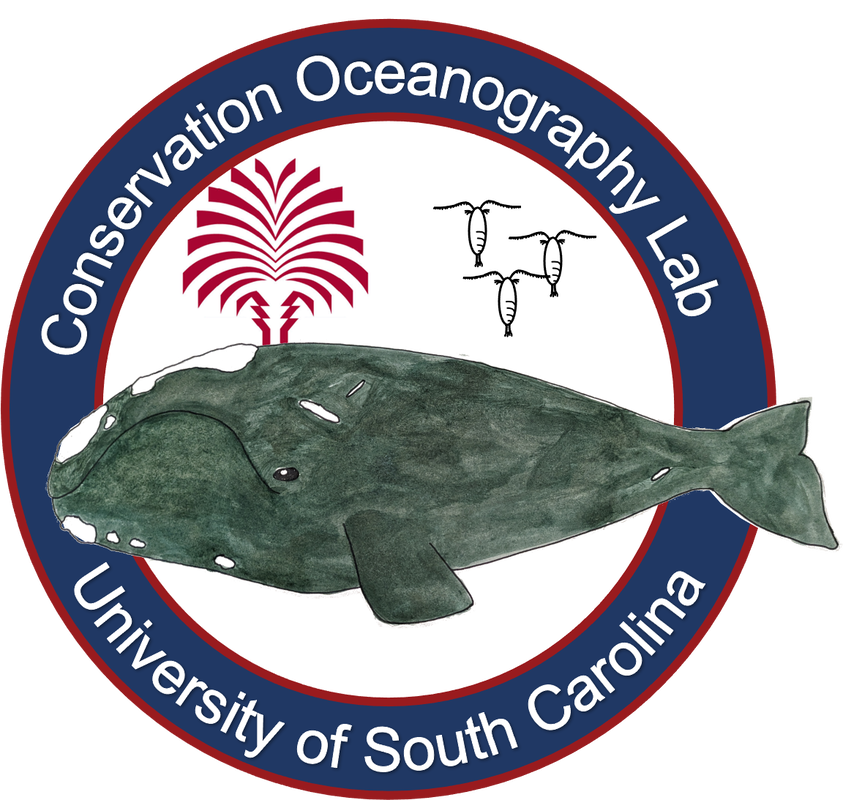|
Our mission:
From the tiniest plankton to the biggest whale, the global oceans are undergoing rapid and unprecedented change due to human influence. Fossil fuel emissions have caused ocean warming, acidification and deoxygenation; chemical pollution and debris can poison or entangle marine life and alter natural nutrient cycles; overfishing has decimated higher trophic levels, including untargeted bycatch; and human activities and infrastructure have directly damaged pristine habitats. Our lab uses large data sets and analytical tools to understand these changes and guide conservation management. |
Research in the news:
The State - There are 340 North Atlantic right whales left. A small underwater robot could save them
NPR - Whales and Ice news article, Morning Edition radio story and Short Wave podcast
New York Times - New Research Helps Explain a Sudden Population Crash for Rare Whales
The Guardian - North Atlantic right whales critically endangered by climate crisis, new study finds
EOS - The Ecological Costs of Removing California's Offshore Oil Rigs
Science Magazine - Endangered right whales are dying off in record numbers off Canada, raising alarm
NPR podcast - Living on Earth - Worrisome right whale deaths
BYU Radio podcast - Top of the Mind with Julie Rose- Why the right whales died
Earther - Right whales can't handle more years like 2017, scientists warn
Canadian Broadcasting Channel podcast - Deep trouble - How researchers are trying to predict where right whales go next
Canadian Broadcasting Channel - Uncertain future of the North Atlantic right whale linked to its tiny prey
Pacific Coast Business Times - UCSB researchers to study biological effects of decommissioning Venoco's Platform Holly
Edhat Santa Barbara - Right whales may face a dim future
Cornell Chronicle - North Atlantic right whale's prospects tied to climate
Ezra Magazine - Creating sustainable fisheries
For more information:
Google Scholar
Research Gate
LinkedIn
The State - There are 340 North Atlantic right whales left. A small underwater robot could save them
NPR - Whales and Ice news article, Morning Edition radio story and Short Wave podcast
New York Times - New Research Helps Explain a Sudden Population Crash for Rare Whales
The Guardian - North Atlantic right whales critically endangered by climate crisis, new study finds
EOS - The Ecological Costs of Removing California's Offshore Oil Rigs
Science Magazine - Endangered right whales are dying off in record numbers off Canada, raising alarm
NPR podcast - Living on Earth - Worrisome right whale deaths
BYU Radio podcast - Top of the Mind with Julie Rose- Why the right whales died
Earther - Right whales can't handle more years like 2017, scientists warn
Canadian Broadcasting Channel podcast - Deep trouble - How researchers are trying to predict where right whales go next
Canadian Broadcasting Channel - Uncertain future of the North Atlantic right whale linked to its tiny prey
Pacific Coast Business Times - UCSB researchers to study biological effects of decommissioning Venoco's Platform Holly
Edhat Santa Barbara - Right whales may face a dim future
Cornell Chronicle - North Atlantic right whale's prospects tied to climate
Ezra Magazine - Creating sustainable fisheries
For more information:
Google Scholar
Research Gate


